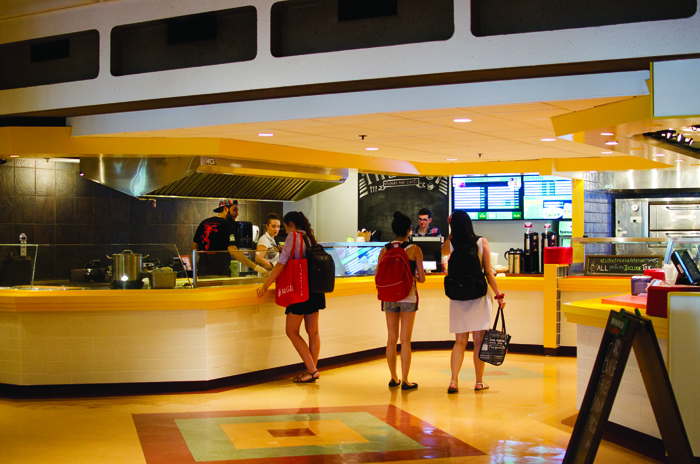In additin to The Nest, a new, yet-to-be-named food provider has opened in the Students’ Society of McGill University (SSMU) cafeteria this Fall. Both are student-run operations and together make up the Student-Run Café (SRC). This new addition is part of a larger plan by SSMU to move away from commercial tenants in the SSMU Building and towards student-run food providers.
The focus of a student-run food provider should be to offer affordable, healthy food that accommodates a wide variety of dietary needs and preferences. But given SSMU’s current financial state, the new SRC must make money. SSMU Vice-President (Finance and Operations) Zacheriah Houston told the Tribune that SSMU was giving up a guaranteed revenue of rent paid by commercial tenants for revenue that hinges on the new SRC’s profitability. He stated that he doesn’t foresee the SRC running a deficit similar to the $20,000 one that it experienced in Winter 2014, its first semester of operation, saying that SSMU has budgeted the new operation to run on a surplus, and that running a deficit is not an option. This is an alarming statement, as there is ample reason to be skeptical of the new SRC’s ability to generate revenue.
The SRC and the larger move towards student-run food providers present a tradeoff. On one hand, the change benefits students by ensuring that food providers on campus are open to student consultation and mandated with providing local and diet-sensitive options. On the other, such improvements are at the cost of lost guaranteed revenue to SSMU through rent, which could mean a potential loss of services for students. SSMU has already had to correct accounting errors, entailing a budget revision. SSMU is currently not in a position to lose any revenue, making the opening of another student-run operation a well-intentioned, but poorly-timed endeavour.
In its current form, the SRC will face stiff competition on campus. In terms of potential to generate rent, the food operations’ location is highly valuable to SSMU. But it has low visibility to students, who may prefer other options closer to their classes and activities. Simply put, students don’t know it’s there. SNAX, by contrast, resides in a campus thoroughfare and as a result enjoys a steady stream of caffeine-hungry students. The new portion of the SRC is offering selections available at most large McGill Food and Dining Service (MFDS) locations, but does not accept the McGill meal plan. At the moment, it is a less convenient, less original option.
As long as The Nest retains its mandate as a sustainability hub, it will likely either run another deficit or, at best, break even. If this is the case, any revenue generated from the SRC will have to come from its new portion. And even if the SRC does generate revenue, if it is less than the rent previously paid to SSMU commercial tenants, then SSMU will have lost money.
While student consultation may help to balance out the costs of visiting the SRC by offering products not found elsewhere on campus, it is unlikely to be a total remedy. While the SRC currently intends to offer less expensive options, only time will tell whether students want to purchase items they can get more easily elsewhere.
Student consultation will ensure that the SRC provides a product that is demanded on campus. The caveat is that SSMU will rely on it to generate a sufficient revenue stream, otherwise other services may suffer. These two goals are not necessarily irreconcilable; however, in the case of the new SRC seem highly unlikely.









